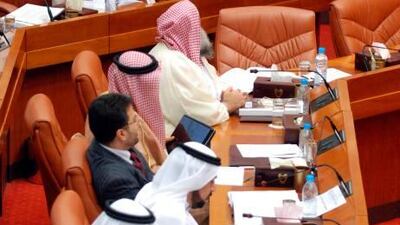MANAMA // Bahrain's royally appointed upper house of parliament is necessary to prevent legislators from passing laws, such as a ban on alcohol, that could hurt the economy, a member of the royal family has said.
The 40-seat Consultative Council, together with the popularly elected 40-member Chamber of Deputies, make up Bahrain's legislature. Without the checks the council provides on the lower house, "this country would be taken back to the Middle Ages", said Sheikh Abdulaziz Al Khalifa, a former ambassador to the United Kingdom who serves as an adviser to the government's information authority.
"If you've got a religious bloc gaining the most seats in the Chamber of Deputies, then where do the bankers go, where do the lawyers, where do the ethnic minorities go?" he asked.
Sheikh Abdulaziz said the bicameral system "ensured people from all walks of life were covered". Bahrain's two-chamber parliament has been a major source of contention since the constitution came into effect in 2002. Under the constitution, legislation must be approved by both houses to become law. Critics say this gives the Consultative Council, and the king that appoints its members, an undemocratic veto on legislation proposed by the lower house.
In an interview, Sheikh Abdulaziz said that if both chambers were elected, Islamists could introduce measures such as an alcohol ban, which would damage the country's economy. In contrast, Sheikh Abdulaziz said, the Consultative Council is full of forward-thinking members "who know what we need to create foreign direct investment, to create jobs". He predicted that voters would realise one day that the legislators who serve them best should not be selected on the basis of their "religious background".
One former member of parliament for a religious party, Adel al Maawdah, of the Salafi political society Al Asalah, said his party's main concerns were housing shortages, pensions, teachers' rights and the distribution of state land. He acknowledged, however, that "alcohol is an issue that people are very annoyed with, and I blame the government". Some hotels "are just for prostitutes and liquor, that's all", he said. "It's very ugly. At least clean the country of these hotels."
He said the country loses money because of the extra spending on alcohol-related traffic accidents and policing. Sheikh Abdulaziz said Islamists tried to ban alcohol before the summer, and the Consultative Council proposed a compromise under which alcohol would only be served to foreigners. He said the lower house rejected the proposal because "they wanted all or nothing".
Khalil al Marzooq, a former member of parliament representing Al Wefaq, an Islamist Shiite opposition political society, said that when the people voted in favour of the bicameral parliamentary system, the royal family had given clear indications that "the second chamber, the appointed chamber, would be only for consultation, would have no voting on legislation".
Al Wefaq boycotted elections in 2002 because it was unhappy with the powers of the Consultative Council. But, Mr Marzooq said, because there were opposition members in parliament, it passed legislation that hinder "people from practising their human rights". He cited the counterterrorism law, which has been criticised for defining terrorist crimes too broadly and restricting freedom of assembly and expression.
As a result, the society participated in the 2006 election. "We will continue participating not because we like the democratic structure that we've been given. We're fighting to change the parliament to what we agreed in the national charter," Mr Marzooq said. For some of Bahrain's politicians, the power of the Consultative Council makes participation in the system pointless.
"The elected chamber has no teeth because of the existence of the other one. They may discuss any matter they like, but it is in the end in the hands of the appointed one," said Ali Qassim Rabia, who was a member of a parliament that was dissolved in 1975.
"I was not happy with the new constitution when I read it. I thought it is useless to participate in something feeling that you can do nothing for the people," he said. Mr Rabia, a Sunni, joined the Al Haq Movement, a coalition of Shiite Islamists and liberals who oppose the political process. Mr Rabia said the realisation by some in the opposition that they were powerless to effect change has led to street violence. "They express their discontent by blocking the roads in the villages and making clashes with security, unfortunately," he said. "A political solution is far, far better than a security solution."

